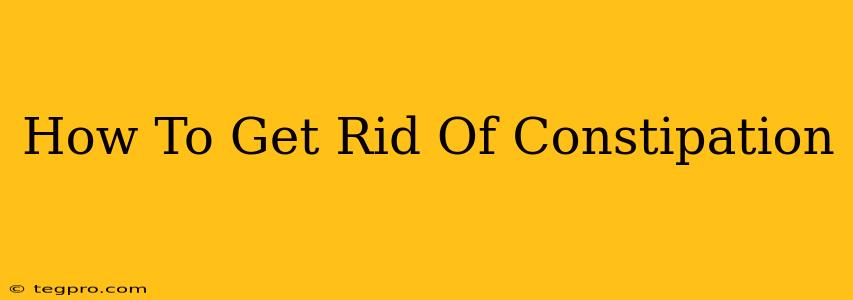Constipation is a common digestive problem characterized by infrequent or difficult bowel movements. It can be uncomfortable and even painful, impacting your overall well-being. This comprehensive guide explores effective ways to relieve constipation and prevent future occurrences.
Understanding Constipation
Before diving into solutions, it's crucial to understand what causes constipation. Several factors can contribute, including:
- Diet: A diet low in fiber is a primary culprit. Fiber adds bulk to your stool, making it easier to pass.
- Dehydration: Insufficient water intake hardens stool, making elimination difficult.
- Lack of Exercise: Physical activity stimulates bowel movements.
- Medications: Certain medications, such as opioids and some antacids, can cause constipation as a side effect.
- Ignoring the urge to defecate: Delaying bowel movements can lead to harder stools.
- Medical Conditions: Underlying medical conditions like irritable bowel syndrome (IBS), hypothyroidism, and diabetes can contribute to constipation.
Effective Ways to Relieve Constipation
If you're experiencing constipation, several strategies can provide relief:
1. Increase Fiber Intake
Fiber is your best friend when it comes to combating constipation. Aim to increase your fiber intake gradually to avoid gas and bloating. Good sources of fiber include:
- Fruits: Apples, bananas, berries, pears
- Vegetables: Broccoli, Brussels sprouts, carrots, spinach
- Whole Grains: Oats, brown rice, whole-wheat bread
- Legumes: Beans, lentils
2. Stay Hydrated
Drink plenty of water throughout the day. Water softens stool, making it easier to pass. Aim for at least 8 glasses of water daily. Other fluids like herbal teas can also contribute to hydration.
3. Exercise Regularly
Regular physical activity stimulates bowel movements. Aim for at least 30 minutes of moderate-intensity exercise most days of the week. Even a brisk walk can make a difference.
4. Establish a Regular Bowel Habit
Try to go to the toilet at the same time each day, even if you don't feel the urge. This can help train your bowels to become regular.
5. Consider Over-the-Counter Remedies
Several over-the-counter remedies can help relieve constipation. These include:
- Fiber supplements: Psyllium husk and methylcellulose are common examples.
- Stool softeners: These lubricate the stool, making it easier to pass.
- Laxatives: Use laxatives only as directed and for short-term relief, as overuse can lead to dependence.
6. When to See a Doctor
While many cases of constipation can be managed at home, you should consult a doctor if:
- Your constipation is persistent or severe.
- You experience sudden changes in bowel habits.
- You have blood in your stool.
- You experience severe abdominal pain or bloating.
Preventing Constipation
Preventing constipation is often easier than treating it. By incorporating these lifestyle changes, you can improve your bowel regularity:
- Eat a high-fiber diet: Focus on whole grains, fruits, vegetables, and legumes.
- Drink plenty of fluids: Aim for at least eight glasses of water per day.
- Exercise regularly: Incorporate physical activity into your daily routine.
- Listen to your body: Don't ignore the urge to have a bowel movement.
- Manage stress: Stress can impact bowel function.
Conclusion
Constipation can be a bothersome problem, but by implementing these strategies, you can effectively relieve symptoms and prevent future occurrences. Remember to consult your doctor if your constipation is persistent, severe, or accompanied by other symptoms. Prioritizing a healthy lifestyle, including a balanced diet, regular exercise, and adequate hydration, is key to maintaining a healthy digestive system and avoiding constipation.

